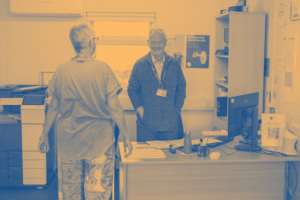Citizens Advice: Diss, Thetford and District urges government against “devastating” Universal Credit cut
● Local charity says 76% of people seeking its advice on benefits have never needed its support before
● Number of people claiming Universal Credit in South Norfolk has risen 114% since the pandemic began
A local charity has warned of the “devastating impact” of a scheduled cut to Universal Credit in April.
Staff and volunteers at Citizens Advice: Diss, Thetford and District have helped 800 people with Universal Credit since March last year. Around 76% of people in the Norfolk-Suffolk border area seeking its advice on benefits have never contacted the charity before.
Advisers say many needing support from the benefits system have lost their job or suffered a drop in income as a result of the pandemic.
Citizens Advice: Diss, Thetford and District, which has continued to provide one-to-one support throughout the pandemic, warns that local families could be pushed into further hardship if the £20 a week Universal Credit uplift ends as planned in April.
In South Norfolk the number of people claiming Universal Credit has risen 114% since the pandemic started. This compares to a rise of 96% nationally.
For households in South Norfolk, the loss of £20 a week is equivalent to over 6 days of energy bills, or nearly 3 days worth of food.
Christina Arnold, a Universal Credit adviser at Citizens Advice: Diss, Thetford and District said:
“I support the #KeepTheLifeline campaign. Pre-Covid, 4.2 million children lived in poverty in the UK. The Government must #KeepTheUplift to avoid this increasing. Families should not have to survive by relying on food bank provision. They do not deserve destitution. We see clients discussing the ripple effects of covid; needing support with issues such as relationship breakdowns, potential homelessness, employment law and mental health issues. Whilst £20 a week does not solve these issues, the pressure of financial insecurity exacerbates them.
Reducing UC entitlement can only serve to further compromise a claimant’s quality of life and be a catalyst to social issues such as these.”
When asked “how did having your Universal Credit increase by £20 a week affect you,” one Citizens Advice: Diss, Thetford and District client stated that “it was the difference between eating and not eating.” Furthermore, when asked “how would losing £20 a week from Universal Credit affect you,” another client said “I struggle as it is, so losing this would cause a great deal of anxiety, exacerbating my condition. I don’t know how I would pay all the bills, eat and keep warm enough.”
Mel Jones, Chief Officer of Citizens Advice: Diss, Thetford and District said:
“We support people every day whose lives have been turned upside down by this pandemic. For many of them, Universal Credit is the lifeline that has helped pay the bills and put food on the table.
“But households across South Norfolk now face the devastating prospect of a £20 a week cut to their benefits in just a few short months.
“With a tough outlook in the jobs market, we’re urging the government to continue doing the right thing and maintain the Universal Credit uplift.”
-ends-
For more information contact:
Mel Jones (Chief Officer of Citizens Advice: Diss, Thetford and District) – Tel: 01379 642291 Email – mel.jones@cadat.org.uk
We give people the knowledge and confidence they need to find their way forward – whoever they are, and whatever their problem.
Notes to editors:
1. Due to lockdown, all of our face to face services are suspended at present. However, you can still access support over the phone at our Norfolk Adviceline by calling 0800 144 88 48, through using our webchat service by going to citizensadvice.org.uk. Both services operate between 9am and 5pm on weekdays.
2. Citizens Advice also runs a Help to Claim service which can support you with making a Universal Credit claim. For more information visit citizensadvice.org.uk or call 0800 144 8 444.
3. To calculate how much £20 a week is equivalent to in everyday spending, we analysed the 2018-19 Living Costs and Food Survey (the latest available data). This is a large, nationally representative survey run by the Office for National Statistics looking at household spending. To make sure we better reflect the likely experience of households on Universal Credit, we have only included households in the bottom half of the income distribution in our analysis. This is because, on average higher-income households spend more than lower-income households.
4. To calculate the percentage increase in the number of people claiming Universal Credit since the pandemic, this is based on DWP statistics covering the period from March to December.





